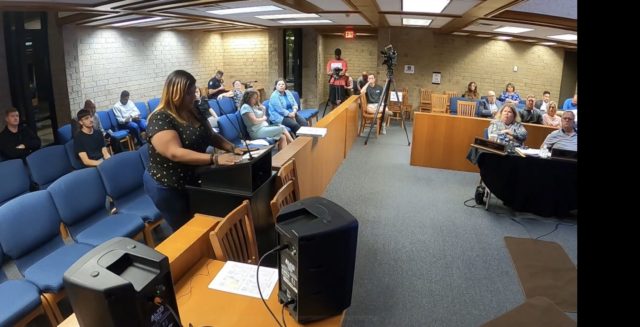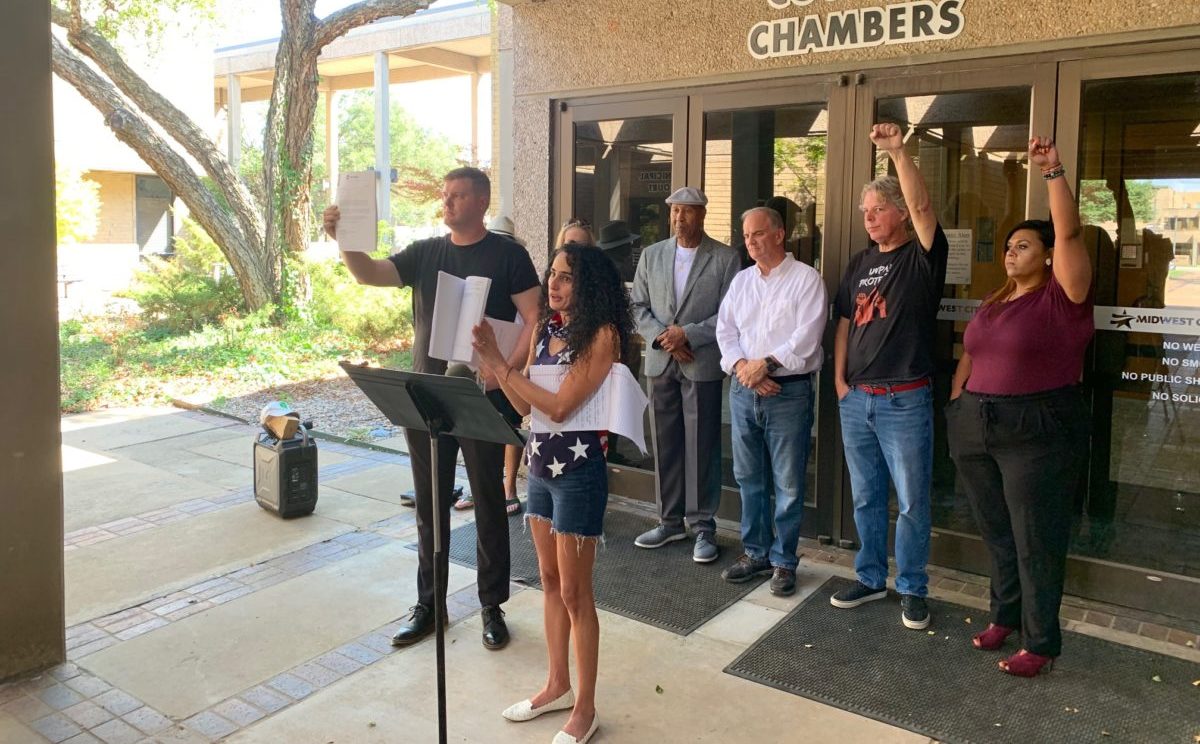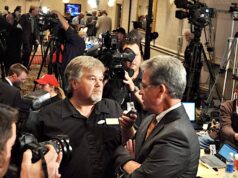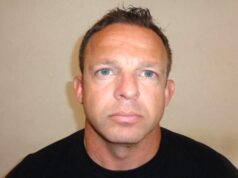
(Update: At its Dec. 13 meeting, the Midwest City City Council voted 6-0 — with Councilwoman Sara Bana abstaining — to approve the resolution regarding public comment. The article below remains in its original form.)
For Tuesday evening’s City Council meeting, Midwest City Mayor Matt Dukes has proposed a new resolution that would prohibit people from speaking during public comment periods unless they are residents of Midwest City or operate a business in the Oklahoma County municipality, with some exceptions.
The agenda item comes as a response to a Sept. 27 meeting where several people who are not Midwest City residents spoke in support of Midwest City ending its relationship with the Oklahoma County Criminal Justice Advisory Council, otherwise known as CJAC. The council later voted to end its relationship with CJAC.
Dukes, who voted to retain the CJAC relationship and who admonished the Sept. 27 speakers for going over their allotted time, did not respond to an email or a phone message requesting comment on his proposed resolution prior to the publication of this story.
But Dukes did outline his proposal to fellow City Council members and city staff last week in an email obtained by NonDoc.
“On this agenda will be a resolution adopting changes in the way we conduct our council meetings,” Dukes wrote. “These changes are a direct result of the September 27 council meeting and reflect concerns that were brought forward by staff and constituents.”
The proposed resolution is listed last among “discussion items” on Tuesday’s agenda, and it calls for “discussion, consideration, and possible action of a resolution establishing the City of Midwest City elected officials’ meeting practices.”
The full text of the resolution is listed on Page 159 of the board’s agenda packet, and the proposed new rules read:
1. Only residents of the City, and/or identifiable business doing business in or with the City, or where it is required by statue during public hearings may speak during a public meeting.
a. To verify this new requirement, speakers must state their name and City residential/ business address before addressing the elected officials.
2. There will be a 4 (four) minute time restriction on each speaker, which can be extended by the chair, only if it benefits and/or clarifies the discussion at hand. The City Clerk, or designee, will be the timekeeper and will notify the chair when time has expired.
3. The Mayor/Chair reserves the right to remove individuals from the audience if they become disorderly. If the Mayor/Chair asks a disruptive individual to leave and the individual refuses to leave, the meeting will be recessed and appropriate law enforcement action will be taken.
The resolution also would establish a requirement for specific “action steps” to be undertaken on any agenda item asking for a vote from elected officials.
In his email to other council members, Dukes wrote that he initially did not think the City Council had the ability to impose limitations on who can speak at meetings, but after doing a “deep dive” into the issue he said the council has the power to do so.
“Actually there is no constitutional requirement that states we have to allow anyone to address council at all,” Dukes wrote. “So with that said, if adopted by a majority vote, only Midwest City residents will be allowed to address the council except when required by statute.”
Dukes wrote that his aim with the resolution is to make city meetings more efficient.
“As I have said before, we have a moral and fiduciary responsibility to conduct the business of the city in a professional and business-like manner,” Dukes wrote.
Public comment rules vary by city
If the seven-person Midwest City City Council approves Dukes’ resolution tonight, it would differentiate the community from its metro-area peers.
The OKC City Council permits those who do not live within city limits to address members, but there is a time limit for all speakers.
In Norman, speakers from outside the city are allowed. In all cases, be they Norman residents or people who live elsewhere, speakers may only address the council during the course of a meeting, and their remarks are limited to three minutes.
In Edmond, rules for City Council meetings state that members “will receive comments” from citizens of Edmond. The sign up form for public comment specifies that it is open to “resident or non-resident” speakers.
In Yukon, those wishing to speak also face no residency restriction.
“Anyone having an item of business to present to the City Council that DOES NOT appear on the agenda, please come to the podium at this time and state your name and address,” Yukon’s rules state. “You are requested to limit your presentation to three minutes.”
Oklahoma Municipal League executive director Mike Fina said a city is within its rights to limit public comment to residents only, but he said Midwest City’s proposal is somewhat unusual.
“I wouldn’t say it is common, but they do have the authority,” he said. “There is a misconception that there is some kind of state law that there has to be public comment at a city council meeting, or other public meeting. It’s good government to do so, and a lot of municipalities have public comments, but there is no law requiring it. There is a lot of leeway for city councils to make their own rules when it comes to public comments.”
In 2020, the Norman City Council briefly eliminated its public comment agenda item, which drew stern rebuke from citizens. The council reinstated its public comment portion but now requires speakers to sign up ahead of time.
Fina, who at one time served as Piedmont’s mayor, said he never required those who wished to speak at meetings to be residents.
“We did have a procedure for public comments, but I don’t think anyone minded if someone from outside the city came to speak as long as it was germane to the city,” he said.
The second item on Tuesday’s meeting agenda is a proposed resolution nominating Dukes to be a board member for the District 8 seat on the Oklahoma Municipal League Board of Directors.
MWC City Council member opposes resolution

Midwest City City Council Ward 5 member Sara Bana said she will oppose the resolution because of the people it would exclude.
Bana said she fears the City Council would be shutting out the voices of those who reside on Tinker Air Force Base, commuter staff and students to Rose State College and staff at Midwest City Public Schools who live outside the city limits, as well as homeless people. Bana said her father, who worked at Sam’s Club at the beginning of the pandemic, would not have been able to address the council about mask ordinances if the proposed rules had been in effect at the time.
“While it may not be unconstitutional, it is a clear violation of the universal definitions of human rights in this context,” Bana said. “And of course, why this is coming about is interesting. It goes back to Sept. 27.”
In addition to holding elected office, Bana is also a member of the People’s Council for Justice Reform, which has spoken out against the Oklahoma County jail trust and CJAC at public meetings. She and other activists participated in a press conference and protest ahead of the Sept. 27 MWC City Council meeting that included the agenda item on CJAC.
Several of Bana’s peers in the justice reform group routinely speak during Oklahoma County’s Board of Commissioners meetings, as well as during meetings of the county jail trust. Often, their remarks are delivered forcefully and criticize members of the public bodies. During the nearly six-hour MWC City Council meeting Sept. 27, the group’s remarks were lengthy, pointed and caused back-and-forth with council members.
Bana said Tuesday’s proposed resolution is about content discrimination and control.
“Prior to this, we had a forum that was open, where anyone could come and speak,” Bana said. “We weren’t really strict on the amount of time or when they could speak. If we got to the agenda item the mayor would sometimes ask if anyone in the audience wanted to comment on it and if not we’d move on. Now all of the sudden that has changed. We are going to a limited forum if this new ordinance passes.”
The Midwest City City Council is scheduled to meet at 6 p.m. Tuesday in council chambers, located at 100 N. Midwest Blvd.





















